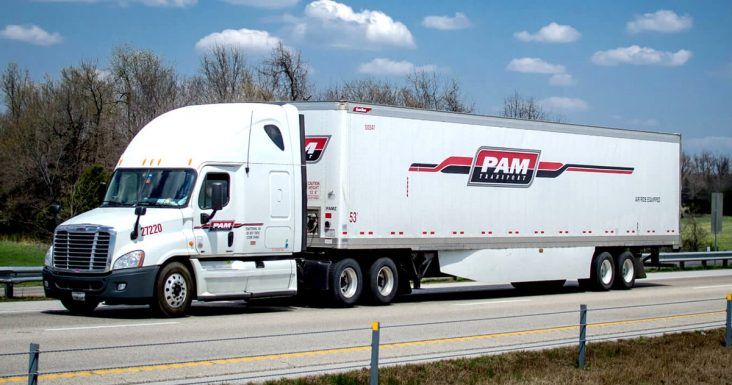P.A.M. earnings fall 50% in third quarter, stock tumbles 16%
by October 15, 2019 8:11 pm 995 views

Tontitown-based carrier P.A.M. Transportation Services Inc. said earnings and revenue fell in the third quarter amid an auto industry strike, and the stock ended the day down more than 16%.
P.A.M. on Tuesday (Oct. 15) reported earnings for the quarter declined 50.5% to $4.58 million, or 79 cents per share, from $9.25 million, or $1.52 per share, in the same period in 2018. Through three quarters, net income has risen 20.2% to $21.54 million, or $3.65 per share, from $17.92 million, or $2.89 per share, in the same period in 2018.
Revenue decreased by 8.1% to $128.99 million in the third quarter, from $140.33 million in the same period in 2018. Through three quarters, revenue has declined 1.1% to $390.68 million, from $395.09 million in the same period in 2018.
Logistics Operations revenue declined 27.5% to $17.71 million, from $24.42 million. Through three quarters, the revenue declined 13.8% to $57.52 million, from $66.75 million.
“I could not be more pleased with our team at P.A.M., particularly in how they have handled adversity this quarter,” President Daniel Cushman said. “I have been working in the trucking industry for over 40 years, and for many of those years, I have felt that it was a vital part of my responsibilities to stay abreast of available information about competition in the industry. Many of our competitors are publicly traded companies, which allows me to read their quarterly earnings releases and gain an understanding of how they are performing, what they are doing and how they are doing it. In reading these releases, I occasionally see mention of unusual events that have negatively impacted their earnings.”
Cushman noted one such event impacting P.A.M. was the United Auto Workers labor strike against General Motors that started Sept. 16. “I don’t recall many mentions by others that compare to such a blow as having your largest customer essentially shut down operations without warning,” he said.
Auto plants typically undergo downtimes in July, and this had historically meant that P.A.M. would lose money in July. However, the company remained profitable throughout the third quarter, even with the auto strike, he said. General Motors is the carrier’s largest customer and represents 20% of its revenue.
Instead of waiting for the strike to end, the carrier worked to find replacement freight for the nearly 400 drivers who were affected, he said. P.A.M. is hopeful the freight it hauled for these customers will continue to be available after the strike ends. The number of drivers has been stable throughout the quarter and was up slightly as of Tuesday.
“I have often been asked if I believe that P.A.M. has the right business model,” Cushman said. “I believe now more than ever, that the answer is ‘yes.’ I believe that P.A.M. performs exceptionally well in two of the most difficult service offerings in the trucking industry — automotive and cross-border Mexico. Mexico continues to be a great contributor, and we continue to make the investments required for success there, including technology, human resources and our state of the art facility in Laredo. Our cross-dock facility in Laredo has assisted in our efforts to diversify with manufacturing and retail customers by utilizing our Logistics services and has also provided replacement freight for assets during the GM strike.”
Revenue in the carrier’s logistics business has fallen similar to other asset-based logistics providers, Cushman said. The decline can be attributed to the decrease in spot rates. Dry van spot rates declined 14% in September, from the same month in 2018, according to DAT Solutions.
Cushman noted its logistics business is unique because it has remained profitable. The business has increased the number of customers and improved coordination with its asset group, which has led to a rise in the number of loads the carrier has handled. Total loads for the quarter rose by 239 loads to 101,047, from the same period in 2018.
P.A.M. is not expected to operate at peak performance until the General Motors strike ends, but the company has shown it can adapt to such issues, Cushman said.
Shares of P.A.M. (NASDAQ: PTSI) closed Tuesday at $57.06, down $10.94, or 16.09%. In the past 52 weeks, the stock has traded between $70.70 and $34.31.
